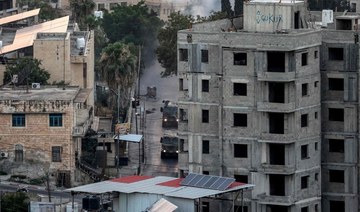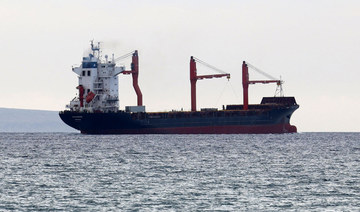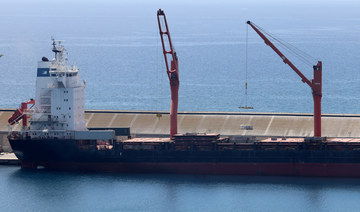RAMALLAH: The Israel Defense Forces declared the end of a large-scale military operation at a refugee camp in Jenin in the occupied West Bank on Wednesday, that left 12 Palestinians and one Israeli soldier dead.
Thousands of Palestinian mourners joined a funeral procession where militants fired into the air and the crowd chanted: “With our souls and blood, we will sacrifice for you, martyr.”
The mourners called for national unity and urged the international community to intervene and protect defenseless Palestinians from continuous IDF violence and aggression, including airstrikes, which they branded war crimes.
A comprehensive strike was declared in Jenin to mourn the dead and condemn the IDF.
Dozens of youths also expressed anger against the Palestinian Authority, led by President Mahmoud Abbas, which did nothing to help them during the operation. They demanded that its delegation leave the camp and not participate in the funerals.
As the IDF pulled out of Jenin, much of the city’s crowded refugee camp was left in ruins by the incursion which displaced at least 3,000 residents.
The invasion involved about 1,000 soldiers from various elite forces, as well as military vehicles, attack helicopters, and drones for reconnaissance, surveillance, and targeted strikes.
The operation, purportedly to arrest wanted militants and to destroy improvised explosive device-making factories, lasted about 48 hours.
The 12 civilians killed by Israeli forces included five children, and there were more than 140 injuries, 30 of them serious.
The Jenin camp’s water and electricity infrastructure was severely damaged. Millions of dollars will be needed to rebuild it.
Dozens of families were forced to evacuate the camp on Monday night. One of those who fled the attack left a paper for the soldiers saying: “There is ample food in the house and the refrigerator. If you want to withdraw, a back door opens to our neighbors’ patio. We leave 700 shekels ($200) in the freezer if you need money. May God protect you.”
Enas Abahreh, one of the Palestinians who decided to stay put despite the operation said that all the damage the Israelis left behind was worth nothing compared to “the defeat of the occupation and the steadfastness of Jenin.”
She added: “We will live in Jenin, and it will become better and more beautiful than before the occupation’s aggression."
Kifaya Obaid, an employee of the Palestinian Ministry of Justice, returned to her home in Jenin after being away for two nights, only to find its windows smashed.
“All the windows of our house were shattered because our neighbor’s house was bombed with an Israeli missile,” Obeid told Arab News.
She had left with seven of her family members and two children. “We lived through a state of terror we had not experienced for years, especially since the Israeli incursion into the camp happened suddenly and without warning,” she said.
Obaid spent two nights in the house of a colleague. “When their military operation failed, they took revenge on the streets by plowing them with bulldozers.”
Israeli airstrikes against the camp were regionally and internationally condemned.
Francesca Albanese, UN special rapporteur on the occupied Palestinian territories, said: “Israeli air strikes and ground operations in the occupied West Bank that targeted the Jenin refugee camp, killing at least 12 Palestinians, may constitute a war crime.
“The operations of the Israeli forces in the occupied West Bank, the killing and serious injury of the occupied population, the destruction of their homes and infrastructure, and the arbitrary displacement of thousands amount to flagrant violations of international law and standards for the use of force and may constitute a war crime.
“The attacks were the most violent in the West Bank since the destruction of the Jenin camp in 2002.”
She also referred to multiple reports of ambulances being denied access to the camp to evacuate the wounded, which impeded their access to medical assistance.
“It is heartbreaking to see thousands of Palestinian refugees who were displaced and forced out of the camp in great fear at nightfall,” Albanese said.
Palestinian Minister of Awqaf and Religious Affairs Hatem Al-Bakri announced the launch of a relief campaign for the victims.
“The ministry has scheduled the next Friday sermon to talk about the violations and attacks the camp was subjected to,” he said.
Youth organizations and movements across the West Bank, in Nablus, Hebron, and Qalqilya, also called for the reconstruction of the Jenin camp after the Israeli operation.




























